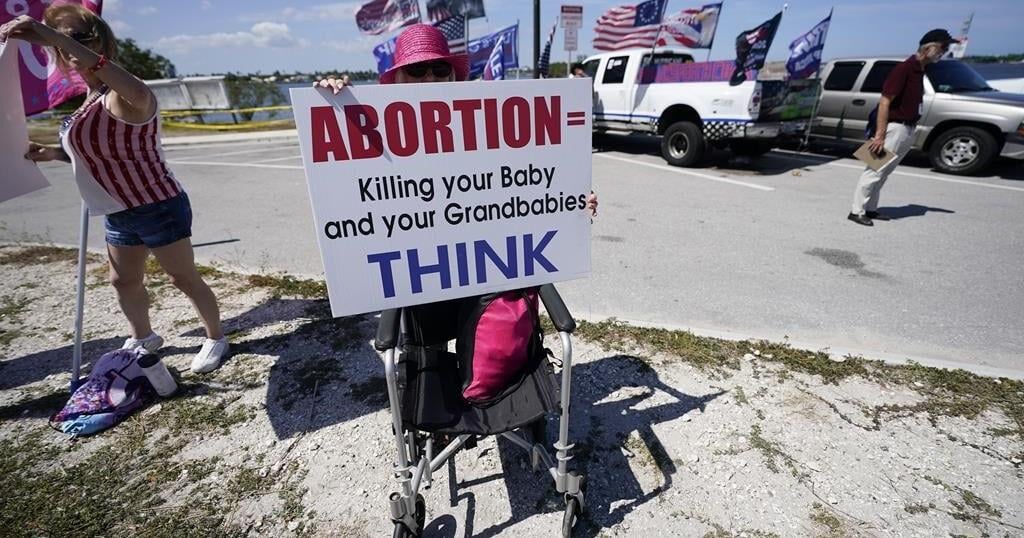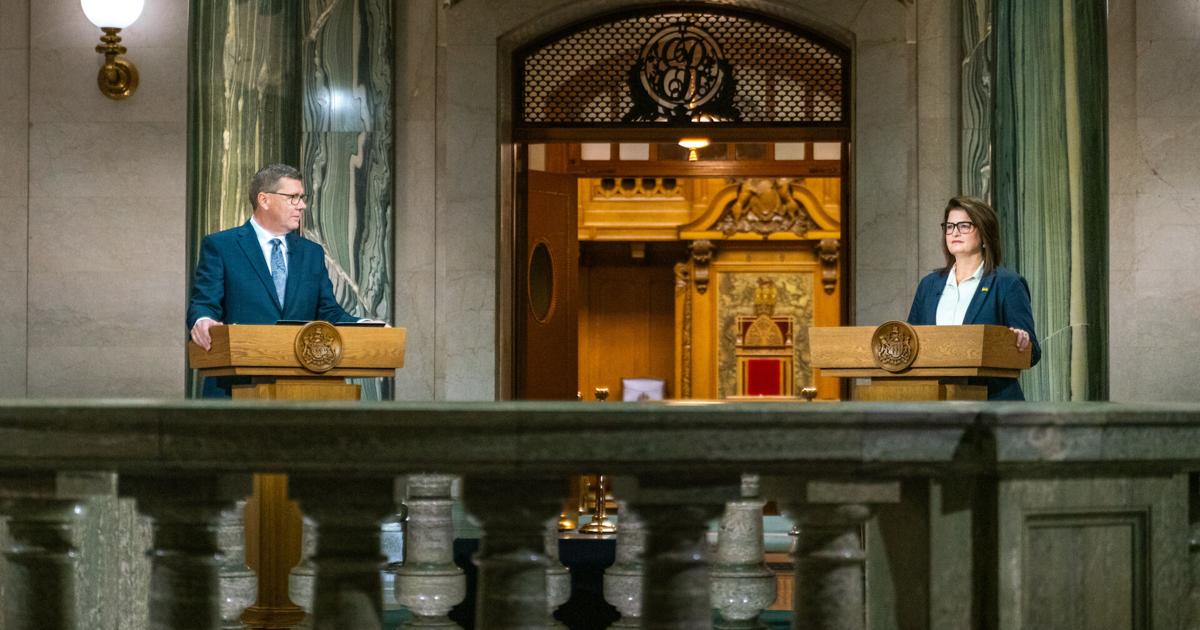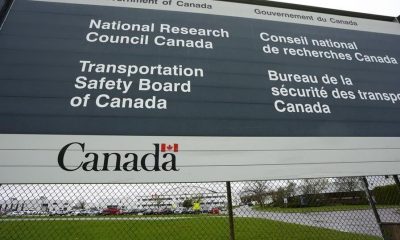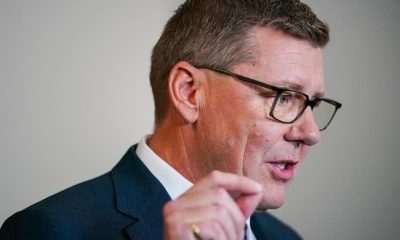BELFAST — U.S. President Joe Biden arrives in Belfast on Tuesday at a delicate political time in Northern Ireland as he helps mark the 25-year anniversary of a peace deal that largely ended 30 years of bloodshed there.
Politics
U.S. President Joe Biden heads to Northern Ireland at delicate political juncture
“The president will have the opportunity to engage with the political parties of Northern Ireland before his speech, and as we’ve said, he looks forward to continuing to engage them as we work to improve the lives and livelihoods of all communities there,” said John Kirby, the White House national security spokesperson.
Biden, who will float the possibility of closer investment ties between the U.S. and Northern Ireland to try to encourage an end to the impasse, clashed with the British government at times during the Brexit talks, drawing a rebuke from the DUP.
“The American involvement here has been a positive and a constructive one and fair in respect to the protocol issues,” Irish Foreign Minister Micheál Martin told national broadcaster RTE, referring to the trade barriers that the European Union and UK agreed to ease in a recent deal endorsed by Biden.
Biden, who will meet British Prime Minister Rishi Sunak on his arrival late on Tuesday and make his an address at Ulster University in Belfast on Wednesday, will use the trip to underscore the United States’ readiness to support Northern Ireland’s “vast economic potential,” the White House said last week.
However, the latest political stalemate is set to overshadow the visit and the anniversary of the peace deal the U.S. helped broker between Irish nationalists seeking a united Ireland and pro-British unionists wanting to remain part of the UK.
Britain’s MI5 intelligence agency recently increased the threat level in Northern Ireland from domestic terrorism to “severe” – meaning an attack is highly likely. It has been mostly at that level since its introduction in 2010.
Biden, who speaks proudly of his Irish roots and frequently quotes Irish poets such as Seamus Heaney, will then spend three days in Ireland where he will address the parliament in Dublin and visit his ancestral homes on either coast.
He will meet distant cousins in County Louth on Wednesday and give a public address in the western county of Mayo, where his great-great-grandfather Edward Blewitt grew up, before departing on Friday.
“Since (Jonh F.) Kennedy there hasn’t been as Irish American a president as Joe Biden and we’re really looking forward to welcoming him home,” Irish Prime Minister Leo Varadkar said on Sunday. (Additional reporting by Steve Holland in Washington; Writing by Padraic Halpin in Dublin; Editing by Kirsten Donovan)

Politics
Trump is consistently inconsistent on abortion and reproductive rights

CHICAGO (AP) — Donald Trump has had a tough time finding a consistent message to questions about abortion and reproductive rights.
The former president has constantly shifted his stances or offered vague, contradictory and at times nonsensical answers to questions on an issue that has become a major vulnerability for Republicans in this year’s election. Trump has been trying to win over voters, especially women, skeptical about his views, especially after he nominated three Supreme Court justices who helped overturn the nationwide right to abortion two years ago.
The latest example came this week when the Republican presidential nominee said some abortion laws are “too tough” and would be “redone.”
“It’s going to be redone,” he said during a Fox News town hall that aired Wednesday. “They’re going to, you’re going to, you end up with a vote of the people. They’re too tough, too tough. And those are going to be redone because already there’s a movement in those states.”
Trump did not specify if he meant he would take some kind of action if he wins in November, and he did not say which states or laws he was talking about. He did not elaborate on what he meant by “redone.”
He also seemed to be contradicting his own stand when referencing the strict abortion bans passed in Republican-controlled states since the Supreme Court overturned Roe v. Wade. Trump recently said he would vote against a constitutional amendment on the Florida ballot that is aimed at overturning the state’s six-week abortion ban. That decision came after he had criticized the law as too harsh.
Trump has shifted between boasting about nominating the justices who helped strike down federal protections for abortion and trying to appear more neutral. It’s been an attempt to thread the divide between his base of anti-abortion supporters and the majority of Americans who support abortion rights.
About 6 in 10 Americans think their state should generally allow a person to obtain a legal abortion if they don’t want to be pregnant for any reason, according to a July poll from The Associated Press-NORC Center for Public Affairs Research. Voters in seven states, including some conservative ones, have either protected abortion rights or defeated attempts to restrict them in statewide votes over the past two years.
Trump also has been repeating the narrative that he returned the question of abortion rights to states, even though voters do not have a direct say on that or any other issue in about half the states. This is particularly true for those living in the South, where Republican-controlled legislatures, many of which have been gerrymandered to give the GOP disproportionate power, have enacted some of the strictest abortion bans since Roe v. Wade was overturned.
Currently, 13 states have banned abortion at all stages of pregnancy, while four more ban it after six weeks — before many women know they’re pregnant.
Meanwhile, anti-abortion groups and their Republican allies in state governments are using an array of strategies to counter proposed ballot initiatives in at least eight states this year.
Here’s a breakdown of Trump’s fluctuating stances on reproductive rights.
Flip-flopping on Florida
On Tuesday, Trump claimed some abortion laws are “too tough” and would be “redone.”
But in August, Trump said he would vote against a state ballot measure that is attempting to repeal the six-week abortion ban passed by the Republican-controlled Legislature and signed by Republican Gov. Ron DeSantis.
That came a day after he seemed to indicate he would vote in favor of the measure. Trump previously called Florida’s six-week ban a “terrible mistake” and too extreme. In an April Time magazine interview, Trump repeated that he “thought six weeks is too severe.”
Trump on vetoing a national ban
Trump’s latest flip-flopping has involved his views on a national abortion ban.
During the Oct. 1 vice presidential debate, Trump posted on his social media platform Truth Social that he would veto a national abortion ban: “Everyone knows I would not support a federal abortion ban, under any circumstances, and would, in fact, veto it.”
This came just weeks after Trump repeatedly declined to say during the presidential debate with Democrat Kamala Harris whether he would veto a national abortion ban if he were elected.
Trump’s running mate, Ohio Sen. JD Vance, said in an interview with NBC News before the presidential debate that Trump would veto a ban. In response to debate moderators prompting him about Vance’s statement, Trump said: “I didn’t discuss it with JD, in all fairness. And I don’t mind if he has a certain view, but I don’t think he was speaking for me.”
‘Pro-choice’ to 15-week ban
Trump’s shifting abortion policy stances began when the former reality TV star and developer started flirting with running for office.
He once called himself “very pro-choice.” But before becoming president, Trump said he “would indeed support a ban,” according to his book “The America We Deserve,” which was published in 2000.
In his first year as president, he said he was “pro-life with exceptions” but also said “there has to be some form of punishment” for women seeking abortions — a position he quickly reversed.
At the 2018 annual March for Life, Trump voiced support for a federal ban on abortion on or after 20 weeks of pregnancy.
More recently, Trump suggested in March that he might support a national ban on abortions around 15 weeks before announcing that he instead would leave the matter to the states.
Views on abortion pills, prosecuting women
In the Time interview, Trump said it should be left up to the states to decide whether to prosecute women for abortions or to monitor women’s pregnancies.
“The states are going to make that decision,” Trump said. “The states are going to have to be comfortable or uncomfortable, not me.”
Democrats have seized on the comments he made in 2016, saying “there has to be some form of punishment” for women who have abortions.
Trump also declined to comment on access to the abortion pill mifepristone, claiming that he has “pretty strong views” on the matter. He said he would make a statement on the issue, but it never came.
Trump responded similarly when asked about his views on the Comstock Act, a 19th century law that has been revived by anti-abortion groups seeking to block the mailing of mifepristone.
IVF and contraception
In May, Trump said during an interview with a Pittsburgh television station that he was open to supporting regulations on contraception and that his campaign would release a policy on the issue “very shortly.” He later said his comments were misinterpreted.
In the KDKA interview, Trump was asked, “Do you support any restrictions on a person’s right to contraception?”
“We’re looking at that and I’m going to have a policy on that very shortly,” Trump responded.
Trump has not since released a policy statement on contraception.
Trump also has offered contradictory statements on in vitro fertilization.
During the Fox News town hall, which was taped Tuesday, Trump declared that he is “the father of IVF,” despite acknowledging during his answer that he needed an explanation of IVF in February after the Alabama Supreme Court ruled that frozen embryos can be considered children under state law.
Trump said he instructed Sen. Katie Britt, R-Ala., to “explain IVF very quickly” to him in the aftermath of the ruling.
As concerns over access to fertility treatments rose, Trump pledged to promote IVF by requiring health insurance companies or the federal government to pay for it. Such a move would be at odds with the actions of much of his own party.
Even as the Republican Party has tried to create a national narrative that it is receptive to IVF, these messaging efforts have been undercut by GOP state lawmakers, Republican-dominated courts and anti-abortion leaders within the party’s ranks, as well as opposition to legislative attempts to protect IVF access.
___
The Associated Press receives support from several private foundations to enhance its explanatory coverage of elections and democracy. See more about AP’s democracy initiative here. The AP is solely responsible for all content.
Politics
Saskatchewan Party’s Scott Moe, NDP’s Carla Beck react to debate |

Saskatchewan‘s two main political party leaders faced off in the only televised debate in the lead up to the provincial election on Oct. 28. Saskatchewan Party Leader Scott Moe and NDP Leader Carla Beck say voters got a chance to see their platforms. (Oct. 17, 2024)
Politics
Saskatchewan political leaders back on campaign trail after election debate

REGINA – Saskatchewan‘s main political leaders are back on the campaign trail today after hammering each other in a televised debate.
Saskatchewan Party Leader Scott Moe is set to make an announcement in Moose Jaw.
Saskatchewan NDP Leader Carla Beck is to make stops in Regina, Saskatoon and Prince Albert.
During Wednesday night’s debate, Beck emphasized her plan to make life more affordable and said people deserve better than an out-of-touch Saskatchewan Party government.
Moe said his party wants to lower taxes and put money back into people’s pockets.
Election day is Oct. 28.
This report by The Canadian Press was first published Oct. 17, 2024.
The Canadian Press. All rights reserved.
-

 News19 hours ago
News19 hours agoDefying Convention to Deepen Connections: Booking.com’s 8 Travel Predictions for 2025
-

 Sports24 hours ago
Sports24 hours agoCanadian men to face Suriname in CONCACAF Nations League quarterfinal
-

 News6 hours ago
News6 hours agoAfter hurricane, with no running water, residents organize to meet a basic need
-

 Sports24 hours ago
Sports24 hours agoArgonauts players Kelly, McManis earn CFL top performer awards
-

 Sports6 hours ago
Sports6 hours agoIn The Rings: Curling Canada still looking for Canadian Curling Trials title sponsor
-

 Politics6 hours ago
Politics6 hours agoN.B. election debate: Tory leader forced to defend record on gender policy, housing
-

 News6 hours ago
News6 hours agoBuhai, Green and Shin lead in South Korea after 8-under 64s in first round
-

 News6 hours ago
News6 hours agoAlberta government shifts continuing care from Health to Seniors Ministry






























